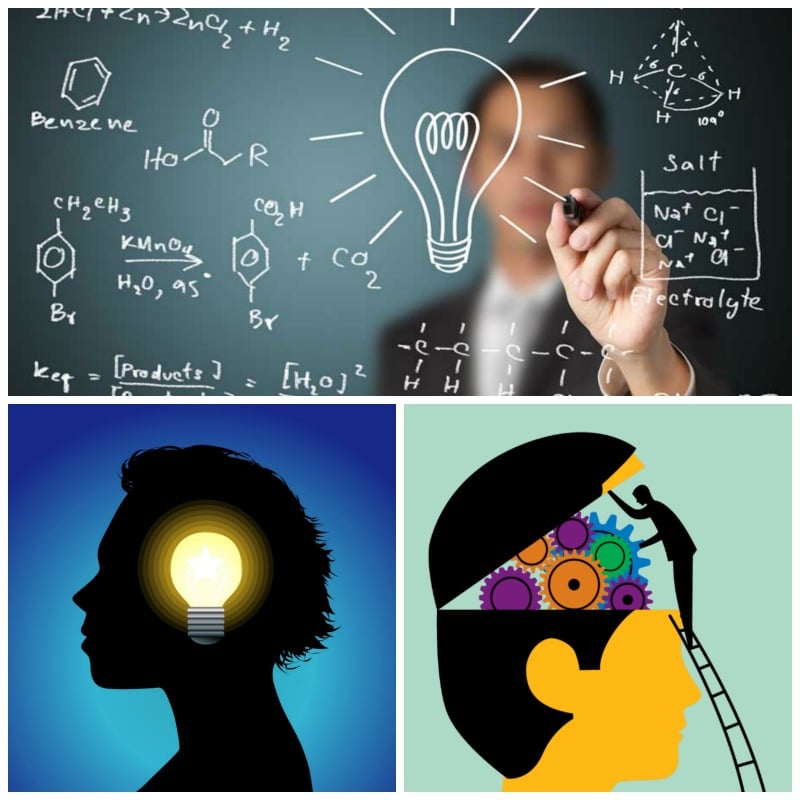It must be borne in mind that knowledge is a rather complicated field, so it is necessary to draw some ideas and make an adequate classification in order to be able to carry out a study with greater depth and effectiveness. Notably all human knowledge has a cultural dimension, and can be expressed through the use of language as well as interpreted in different ways depending on the culture and particular concepts. Without further ado on our part, we are going to show you a list with the main types of knowledge that we must know, as well as their internal classifications.

Knowledge as a function of specificity
In this case we can find two types of classification that would be theoretical knowledge and practical knowledge, which we are going to detail below.
Theoretical knowledge
Regarding theoretical knowledge, they are those in which it seeks to manifest the truth by interpreting reality, so that we find three main alternatives that are the following:
Scientific knowledge
Scientific knowledge is the result of an effort and a methodology based on research through which answers are obtained to specific questions that need to be interpreted.
Philosophical knowledge
For its part, philosophical knowledge is one that seeks the same knowledge but from a critical perspective based on its foundations.
Knowledge based on beliefs
As for the one based on beliefs, we are facing a type of knowledge that is based on the fact of accept such beliefs as self-evident truths. Here in turn we have another subdivision that is the following:
Theological insights
Theological insights are those that are centered on a divine revelation.
Traditional knowledge
However, traditional knowledge is that which is transmitted culturally from generation to generation. This type of knowledge also has a subdivision that is the following:
Local traditional knowledge
They are those that are transmitted in a defined geographical area.
Global traditional knowledge
They are those that are transmitted between different geographical places, being able to become part of cultures that a priori are very different from each other.
Practical knowledge
Regarding practical knowledge, we can say that they are those that aim to study the action that leads us to achieve the objective.
Here we can see five types of practical knowledge:
Moral knowledge
The moral knowledge are those that refer to the norms of social behavior.
Ethical knowledge
When we speak of ethical knowledge we are referring to reasoning in relation to morality to achieve the purpose that we propose.
Political knowledge
Turning to political knowledge, we would enter into those knowledge that are referenced in terms of the foundation and organization of a social power.
Artistic knowledge
Artistic knowledge is practical knowledge that arises from the need for the expression of aesthetic sensitivity and beauty by the human being.
Technical knowledge
Technical knowledge is those that attend to the utility based on the different fields to which they are applied, and in this case we would find four possibilities that are economic production, domestic economy, personal skills and the political and social direction of organizations. .
Knowledge based on its structure
In this sense we are also going to find a classification that is divided into formal knowledge and material knowledge.
Formal knowledge
Formal knowledge are those that do not have material content, but are presented in a logical way through relationships that have been previously defined through the use of symbols.
A good example is mathematics.
Material knowledge
As for material knowledge, it is all the other knowledge that does not fall within the catalog of formal knowledge. Here we have the possibility of finding two alternatives that are:
Knowledge oriented
It is the material knowledge that refers to the relationship between various concepts.
Axiomatic knowledge
It is the material knowledge that refers to the explanations of the final causes as true, that is, the scientific theories.
Knowledge based on its disclosure
Based on its nature of disclosure, there are also different types of knowledge that are public, private, explicit, implicit and codified.
Public knowledge
As for public knowledge, it is about those knowledge that is easy to spread throughout society.
Private knowledge
However, private knowledge is that which is born in the individual who holds it, so that a basis is established for later ascending to public knowledge.
Explicit knowledge
It is the one that can be transmitted from one person to another in a simple way.
Implicit knowledge
It is one that is based on the personal experiences, habits and particular ways of thinking of each one.
Encoded knowledge
It is the knowledge that can be stored preventing any type of information from being lost.

Knowledge based on origin
Regarding knowledge based on its origin, we have three options which are the following:
Analytical knowledge
Also know as a priori knowledge, is the one whose information is based on establish logical relationships based on the content being discussed, being in this way independent of the experience itself, so that a conclusion is obtained from the deduction.
Synthetic knowledge
It is called a posteriori knowledge, so that the information is based on one's own experience, with which a conclusion is obtained from the induction.
Empirical knowledge
In this case we speak of knowledge based solely on experience, so that it can hardly be expressed in words.
Within empirical knowledge we could fundamentally highlight feelings and emotions.
Knowledge based on its purpose
Regarding its purpose, we find three alternatives:
Scientific knowledge
It is a type of knowledge that aims to interpret reality appropriately.
Communicative knowledge
It seeks to transmit certain information previously obtained.
Expressive knowledge
It is one of the types of knowledge that aims to convey feelings and emotions.
Knowledge based on conservation and dissemination support
Based on the conservation and disclosure support, we also have four alternatives which are the following:
Cultural knowledge
It is knowledge in which terms are used and procedures that have been agreed within the group are carried out, so that it can be understood as a cultural sphere from a reduced social group such as a team of scientists, even a complete civilization, passing through a group of friends, sects and in general all kinds of groups based on internally determined knowledge and procedures.
Bibliographic knowledge
It is the knowledge obtained from books and dictionaries.
Artistic knowledge
It is what we obtain from music, painting, literature, sculpture, theater and any other artistic manifestation.
Computerized knowledge
It is also known as digitized knowledge, and it is the one that is born from the use of computer systems.
Knowledge based on the way they are acquired
And to finish our list with the most important types of knowledge we have a new classification that is oriented to the way in which said knowledge has been acquired.
Academic knowledge
Academic knowledge is the knowledge acquired in institutions that have specific purposes and regulations.
Professional knowledge
It is one that is acquired in the exercise of a profession.
Vulgar knowledge
We call vulgar knowledge knowledge that aims to exchange information between equals.
Traditional knowledge
It is the knowledge that is transmitted in a hereditary way based on culture.
Religious knowledge
Finally we have the religious knowledge that is the one that develops within a social institution of a religious type.
With this we finalize our list with the most prominent types of knowledge, hoping that you analyze each one of them well and take into account the different classifications that exist depending on the characteristics and particularities of the different variants, highlighting the way in which they are obtained, the way in which it is transmitted and, of course, also the way in which it manages to achieve the purpose for which it is intended, so that a very interesting classification is organized from which we will be able to understand and study better each of these concepts.
Very complete and interesting congratulations, it is generally very difficult to put these two characters together. Lately it has been shown that intelligence is a very comprehensive concept, we no longer speak of an intelligent person when they have a facility for mathematical and logic problems, now this concept is relative and very broad, each person has greater ease and better performance in a area than another and not for that reason one is more intelligent than the other, so intelligence is not about what you know, but about how fast you learn. I am willing to answer questions and inform you about what you want if you leave me a message on my website or visit my articles.